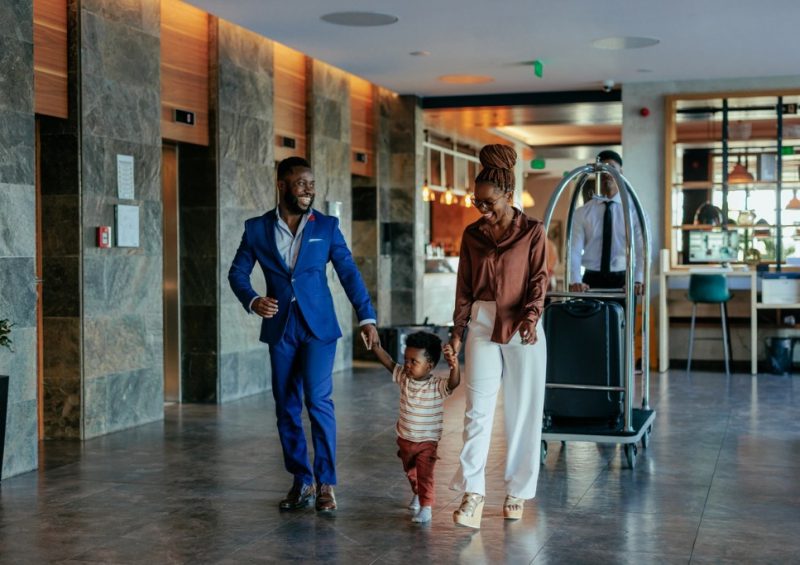We all know the struggle: you arrive at a large, sprawling hotel, your luggage in tow, and all you want to do is find your room and unwind. But navigating a maze of hallways, floors, and amenities can be daunting. Enter the age of mobile apps and their role in wayfinding, which is here to change the guest experience forever.
The Age-Old Challenge of Wayfinding
Wayfinding is a term that has been introduced previously. It refers to the methods and tools we use to navigate complex environments. Think of the signs at an airport, the maps in a shopping mall, or even the breadcrumbs left by Hansel and Gretel. But in today’s fast-paced world, traditional signs just don’t cut it anymore, especially in hotels, where guests want to maximize their stay without getting lost.
Mobile Apps: The Modern Compass
Personalized and timely communication is essential for providing a positive pre-arrival experience. Endeavor to reach out to guests to welcome them, confirm their reservation, and provide them with information about your hotel and its amenities.
- Personalized Navigation: Imagine an app that not only tells you where your room is but also suggests the quickest route to the pool, gym, or dining area based on your preferences. Personalization is key!
- Instant Updates: No more outdated signs or maps. Mobile apps can be updated in real time, ensuring guests always have the most accurate information.
- Interactive Experience: With augmented reality (AR) and virtual reality (VR) features, some apps offer an immersive experience, allowing guests to “walk through” the hotel before even stepping out of their room.
The Impact on Guest Experience
Guest experience is at the heart of the hospitality industry. Hotels that understand and prioritize it always stand out. How does wayfinding via mobile apps enhance this experience?
- Reduced Stress: No one likes getting lost. Mobile apps ensure guests spend less time wandering and more time enjoying their stay.
- Enhanced Engagement: With interactive features, guests can explore the hotel and its services at their own pace, increasing engagement and satisfaction.
- Tailored Recommendations: Based on a guest’s preferences, apps can suggest dining options, spa treatments, or events happening in the hotel.
The Journey of a Guest: Before, During, and After
Mobile apps aren’t just about navigating within the hotel; they play a pivotal role in the entire guest journey.
- Before Arrival: Guests can explore the hotel, check out amenities, and select their preferred room. Some apps allow for virtual tours, giving guests a sneak peek of what awaits them.
- During Stay: Apart from navigation, guests can use the app for room service, spa bookings, or to communicate with the concierge. It becomes an all-in-one tool for a hassle-free stay.
- After Departure: The journey doesn’t end at checkout. Guests can provide feedback, book their next stay, or even access loyalty programs via the app, ensuring they remain connected with the hotel.
Why Every Hotel Needs an App
In today’s digital age, having a mobile app is no longer a luxury but a necessity for hotels. Here’s why:
- Staying Ahead of the Competition: Guests expect modern amenities and digital solutions. Hotels with intuitive mobile apps stand out and attract more bookings.
- Data Insights: Mobile apps can provide valuable data on guest preferences, helping hotels improve and personalize their services.
- Increased Revenue: With features like in-app bookings, promotions, and personalized recommendations, hotels can drive more sales and increase revenue.
Challenges and Solutions
While mobile apps for wayfinding are revolutionary, they aren’t without challenges.
- Technology Integration: Integrating new apps with existing hotel systems can be complex. However, with the right tech team and robust platforms, this can be smoothly addressed.
- User Experience: A poorly designed app can be more frustrating than helpful. Hotels must invest in user-friendly designs and regular updates.
- Adoption: Convincing guests to download and use the app can take time and effort. Offering exclusive promotions or features accessible only via the app can be a solution.
Adopting the Trend: Success Stories from Leading Hotels
In the ever-evolving hospitality landscape, numerous hotels have already embraced mobile apps for wayfinding, setting benchmarks for others. Here are some success stories that highlight the transformative power of these apps:
- The Tech-Savvy Resort: A luxury resort in the Maldives introduced an app that not only provided guests with navigation but also allowed them to book private dinners on the beach, spa sessions, and even scuba diving lessons. The result? A 25% increase in their in-resort bookings and rave guest reviews about their seamless experience.
- The Urban Business Hotel: Situated in a bustling city, this hotel’s app became a lifeline for business travelers. Besides in-hotel navigation, the app offered real-time traffic updates and the best routes to the city’s business hubs. Guests appreciated this thoughtful feature, leading to a spike in repeat bookings.
These success stories underline a simple fact: when hotels align technology with guest needs, magic happens. And in this digital age, mobile apps are at the forefront of creating memorable guest experiences.
Conclusion
The role of mobile apps in revolutionizing wayfinding and enhancing guest experience in hotels cannot be understated. As technology advances and guest expectations evolve, these apps will only become more integral to the hospitality industry. Hotels that recognize and adapt to this trend will undoubtedly lead the way in offering unmatched guest experiences.
Chat with us today to discover how we can help you revolutionize your mobile app strategy in hospitality!








